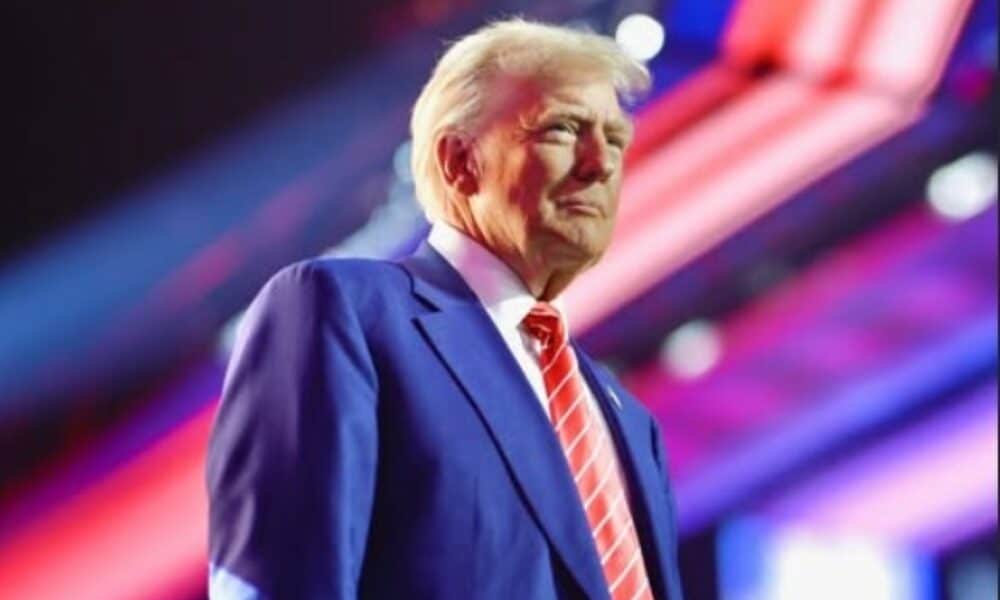President Donald Trump announced on Sunday (9) that starting Monday (10), a 25% tariff will be imposed on all steel and aluminum imports, directly affecting exporting countries, including Brazil. The official announcement is expected today, and experts are already analyzing the potential economic impacts of this measure. Brazil, one of the main steel suppliers to the U.S., could face significant losses if the decision is enforced. In 2024, Brazil was the second-largest exporter of steel to the United States, only behind Canada, and accounted for 18% of the country’s total exports of cast iron, iron, or steel to the American market.
The measure, which aligns with Trump’s protectionist policies, aims to strengthen the U.S. steel industry and reduce dependence on imports. However, it may trigger trade tensions with several countries and negatively impact the global economy. During his previous administration, Trump imposed similar tariffs but later revoked them after negotiations, exempting Brazil and other allies. Now, with his return to power, there is uncertainty as to whether Brazil will be able to negotiate another exemption or if it will need to find alternative markets to mitigate potential damages.
The Brazilian government has yet to issue an official statement regarding the new tariffs. Reports indicate that the Ministry of Development, Industry, and Trade is waiting for the formal announcement from the White House before defining a strategy. However, representatives of Brazil’s steel industry have expressed concern over the consequences of this decision, which could reduce the competitiveness of Brazilian steel in the U.S. market and lead to layoffs and production cuts.
History of U.S. trade tariffs on steel and aluminum
The U.S. government has frequently adopted protectionist measures to strengthen its domestic economy and safeguard strategic industries. Imposing tariffs on steel and aluminum imports is not a new tactic in American trade policy, as it has been used to reduce the trade deficit and encourage local production.
During Donald Trump’s first term in 2018, a 25% tariff on steel and a 10% tariff on aluminum were imposed, directly impacting exporting countries. At the time, the decision sparked protests among trade partners and led to diplomatic disputes. Brazil successfully negotiated a partial exemption, but the initial tariffs harmed Brazilian steel companies, forcing them to seek new markets to compensate for the drop in exports to the U.S.
Now, with Trump back in office, concerns are rising that a new wave of protectionism could lead to trade disputes and slow global growth. Besides steel and aluminum, fears persist that other industries could face similar tariff measures in the future.
Economic impact on Brazil and international trade
The Brazilian economy could be significantly affected by the new tariffs, as the United States is one of the top buyers of Brazilian steel. In 2024, Brazil exported large volumes of cast iron and steel-related products to the U.S., generating billions of dollars in revenue. With the new tariff in place, these exports could decline, affecting industrial production and causing job losses in the sector.
The main potential consequences for Brazil include:
- Decline in exports: Brazilian steel may become less competitive in the U.S. due to the higher tariff, leading to reduced demand.
- Job losses and plant closures: Steel producers might be forced to cut production, shut down furnaces, and lay off workers to balance costs.
- Search for alternative markets: Exporting companies will need to seek new international markets to make up for lost sales in the U.S., a process that takes time and strategic planning.
- Disruptions in industrial supply chains: The Brazilian steel industry supports various sectors, including construction and automotive manufacturing, which may also be indirectly affected.
Beyond Brazil, other major steel and aluminum suppliers to the U.S., such as Canada, Mexico, China, and the European Union, are also expected to be impacted. Their reactions could lead to retaliatory trade measures, potentially escalating into a broader trade conflict that affects global markets.
Brazilian government’s response to the trade crisis
So far, the Brazilian government has not taken an official stance regarding Trump’s new tariffs. Brazilian authorities are closely monitoring developments and considering whether it is possible to negotiate another exemption, as occurred in the past. The Ministry of Development, Industry, and Trade has stated that it will not comment until the White House makes an official announcement.
If the tariffs are enforced, Brazil has several options to minimize the impact:
- Diplomatic negotiations: Seek direct talks with the U.S. government to secure either a full or partial exemption from the tariffs.
- Filing a complaint with the World Trade Organization (WTO): Challenge the tariffs as illegal trade barriers and seek sanctions against the U.S.
- Diversifying export markets: Strengthen trade relationships with other countries and economic blocs, such as the European Union and Asia, to reduce dependence on the U.S. market.
- Domestic industrial policies: Implement incentives to support the national steel industry, including tax breaks and initiatives to stimulate domestic steel consumption.
Brazil is also expected to closely observe how other affected countries respond to Trump’s decision. Canada, the European Union, and China have already expressed dissatisfaction and are evaluating potential countermeasures, which could open the door for multilateral trade negotiations.
International reactions and potential retaliations
Trump’s decision to impose a 25% tariff on steel and aluminum imports has triggered immediate responses worldwide. European Union officials labeled the measure as “unjustified” and hinted at potential countermeasures to protect European industries. Canada, the largest aluminum supplier to the U.S., also voiced concerns and is analyzing its response options.
Among the possible retaliatory actions from affected countries are:
- Tariffs on U.S. goods: Countries may impose tariffs on American imports to counterbalance the impact.
- WTO disputes: Governments may challenge the tariffs as unfair trade practices and seek sanctions against the U.S.
- Shifts in export markets: Steel producers might redirect shipments to other regions, altering global trade dynamics.
- New bilateral trade agreements: Affected nations may pursue alternative trade deals to reduce reliance on the U.S. market.
A rise in trade tensions could lead to a tariff war, similar to the one seen between the U.S. and China in previous years, further impacting the global economy.
Possible effects on the U.S. economy
While Trump’s tariff policy aims to benefit the domestic steel industry, it could have unintended negative consequences for the U.S. economy. Historically, high tariffs on imports tend to increase costs for local manufacturers that rely on imported raw materials.
Experts warn that approximately 50% of the steel used in the U.S. is imported and serves as a key input for sectors like automotive, construction, and technology. Imposing tariffs may raise domestic steel prices, making American-made products more expensive and less competitive in the global market.
Additionally, the risk of trade retaliations could impact U.S. exports, particularly in key markets such as China and the European Union. If major economies choose to respond with tariffs on American goods, industries like agriculture and manufacturing could suffer significant losses.

President Donald Trump announced on Sunday (9) that starting Monday (10), a 25% tariff will be imposed on all steel and aluminum imports, directly affecting exporting countries, including Brazil. The official announcement is expected today, and experts are already analyzing the potential economic impacts of this measure. Brazil, one of the main steel suppliers to the U.S., could face significant losses if the decision is enforced. In 2024, Brazil was the second-largest exporter of steel to the United States, only behind Canada, and accounted for 18% of the country’s total exports of cast iron, iron, or steel to the American market.
The measure, which aligns with Trump’s protectionist policies, aims to strengthen the U.S. steel industry and reduce dependence on imports. However, it may trigger trade tensions with several countries and negatively impact the global economy. During his previous administration, Trump imposed similar tariffs but later revoked them after negotiations, exempting Brazil and other allies. Now, with his return to power, there is uncertainty as to whether Brazil will be able to negotiate another exemption or if it will need to find alternative markets to mitigate potential damages.
The Brazilian government has yet to issue an official statement regarding the new tariffs. Reports indicate that the Ministry of Development, Industry, and Trade is waiting for the formal announcement from the White House before defining a strategy. However, representatives of Brazil’s steel industry have expressed concern over the consequences of this decision, which could reduce the competitiveness of Brazilian steel in the U.S. market and lead to layoffs and production cuts.
History of U.S. trade tariffs on steel and aluminum
The U.S. government has frequently adopted protectionist measures to strengthen its domestic economy and safeguard strategic industries. Imposing tariffs on steel and aluminum imports is not a new tactic in American trade policy, as it has been used to reduce the trade deficit and encourage local production.
During Donald Trump’s first term in 2018, a 25% tariff on steel and a 10% tariff on aluminum were imposed, directly impacting exporting countries. At the time, the decision sparked protests among trade partners and led to diplomatic disputes. Brazil successfully negotiated a partial exemption, but the initial tariffs harmed Brazilian steel companies, forcing them to seek new markets to compensate for the drop in exports to the U.S.
Now, with Trump back in office, concerns are rising that a new wave of protectionism could lead to trade disputes and slow global growth. Besides steel and aluminum, fears persist that other industries could face similar tariff measures in the future.
Economic impact on Brazil and international trade
The Brazilian economy could be significantly affected by the new tariffs, as the United States is one of the top buyers of Brazilian steel. In 2024, Brazil exported large volumes of cast iron and steel-related products to the U.S., generating billions of dollars in revenue. With the new tariff in place, these exports could decline, affecting industrial production and causing job losses in the sector.
The main potential consequences for Brazil include:
- Decline in exports: Brazilian steel may become less competitive in the U.S. due to the higher tariff, leading to reduced demand.
- Job losses and plant closures: Steel producers might be forced to cut production, shut down furnaces, and lay off workers to balance costs.
- Search for alternative markets: Exporting companies will need to seek new international markets to make up for lost sales in the U.S., a process that takes time and strategic planning.
- Disruptions in industrial supply chains: The Brazilian steel industry supports various sectors, including construction and automotive manufacturing, which may also be indirectly affected.
Beyond Brazil, other major steel and aluminum suppliers to the U.S., such as Canada, Mexico, China, and the European Union, are also expected to be impacted. Their reactions could lead to retaliatory trade measures, potentially escalating into a broader trade conflict that affects global markets.
Brazilian government’s response to the trade crisis
So far, the Brazilian government has not taken an official stance regarding Trump’s new tariffs. Brazilian authorities are closely monitoring developments and considering whether it is possible to negotiate another exemption, as occurred in the past. The Ministry of Development, Industry, and Trade has stated that it will not comment until the White House makes an official announcement.
If the tariffs are enforced, Brazil has several options to minimize the impact:
- Diplomatic negotiations: Seek direct talks with the U.S. government to secure either a full or partial exemption from the tariffs.
- Filing a complaint with the World Trade Organization (WTO): Challenge the tariffs as illegal trade barriers and seek sanctions against the U.S.
- Diversifying export markets: Strengthen trade relationships with other countries and economic blocs, such as the European Union and Asia, to reduce dependence on the U.S. market.
- Domestic industrial policies: Implement incentives to support the national steel industry, including tax breaks and initiatives to stimulate domestic steel consumption.
Brazil is also expected to closely observe how other affected countries respond to Trump’s decision. Canada, the European Union, and China have already expressed dissatisfaction and are evaluating potential countermeasures, which could open the door for multilateral trade negotiations.
International reactions and potential retaliations
Trump’s decision to impose a 25% tariff on steel and aluminum imports has triggered immediate responses worldwide. European Union officials labeled the measure as “unjustified” and hinted at potential countermeasures to protect European industries. Canada, the largest aluminum supplier to the U.S., also voiced concerns and is analyzing its response options.
Among the possible retaliatory actions from affected countries are:
- Tariffs on U.S. goods: Countries may impose tariffs on American imports to counterbalance the impact.
- WTO disputes: Governments may challenge the tariffs as unfair trade practices and seek sanctions against the U.S.
- Shifts in export markets: Steel producers might redirect shipments to other regions, altering global trade dynamics.
- New bilateral trade agreements: Affected nations may pursue alternative trade deals to reduce reliance on the U.S. market.
A rise in trade tensions could lead to a tariff war, similar to the one seen between the U.S. and China in previous years, further impacting the global economy.
Possible effects on the U.S. economy
While Trump’s tariff policy aims to benefit the domestic steel industry, it could have unintended negative consequences for the U.S. economy. Historically, high tariffs on imports tend to increase costs for local manufacturers that rely on imported raw materials.
Experts warn that approximately 50% of the steel used in the U.S. is imported and serves as a key input for sectors like automotive, construction, and technology. Imposing tariffs may raise domestic steel prices, making American-made products more expensive and less competitive in the global market.
Additionally, the risk of trade retaliations could impact U.S. exports, particularly in key markets such as China and the European Union. If major economies choose to respond with tariffs on American goods, industries like agriculture and manufacturing could suffer significant losses.







